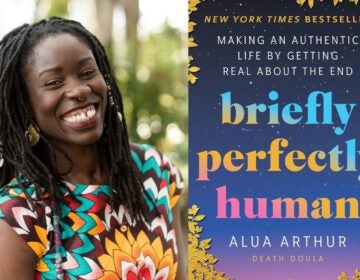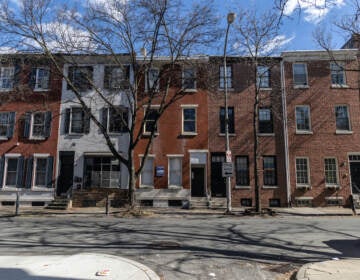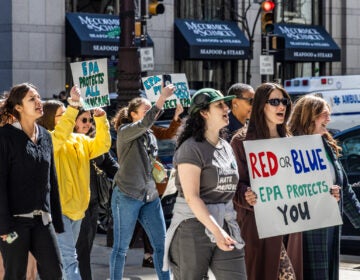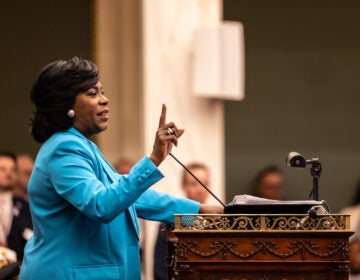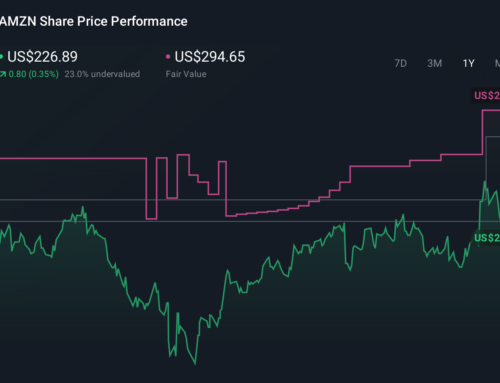These Philly-area doulas want parents to think about environmental exposures
April 22, 2025
Have a question about Philly’s neighborhoods or the systems that shape them? PlanPhilly reporters want to hear from you! Ask us a question or send us a story idea you think we should cover.
Tina Brown helps moms stay healthy through their pregnancies, guides them in the delivery room and coaches them through breastfeeding their new babies through her doula service in Southwest Philadelphia, NatureMomz.
“I try to preach healthy mind, body and soul — and by that I mean even your environment,” Brown said.
Environmental exposures such as heat, air pollution, lead and other toxins can complicate pregnancies and harm the health of parents and babies.
Doulas are non-clinical professionals who provide physical and emotional support during pregnancy, birth and the postpartum period, ensuring their clients get the information they need. Studies have found doula guidance is associated with fewer premature deliveries, reduced anxiety and improved breastfeeding success.
For example, when Brown’s clients report trouble breathing, she tries to help them identify potential triggers for respiratory issues.
“We talk about, what do they have in their home?” Brown said. “Are they wearing perfume? What are they cleaning with?”
Endocrine-disrupting chemicals, present in products such as fragrances, flame retardants and toys, have been found to cross the blood-placenta barrier and result in higher levels of metabolic syndrome once children reach elementary school. Exposure to air pollution during pregnancy has been associated with a higher risk of preterm births, infant respiratory issues as well as postpartum depression. Exposure to high heat during pregnancy is tied to low birth weights and stillbirths — as well as complications including hypertensive disorders, according to the CDC. Lead in a person’s blood during pregnancy can harm the developing baby’s brain and cause learning or behavior challenges later on.
“The environment really counts,” said Vera Thompson-Jenkins, a certified perinatal doula who works with the Maternity Care Coalition and CocoLife, an organization working to reduce race-related disparities in maternal health. “Our goal is to make sure that everyone receives the information.”
Black women experience much higher rates of maternal mortality than white and Hispanic women, in part due to discrimination within the healthcare system. People of color in the U.S. are also exposed to more particulate air pollution on average than white Americans, regardless of income, a study funded by the U.S. Environmental Protection Agency found.
At an EnviroNatal Day event at Bartram’s Garden last Thursday organized by Brown, representatives from the nonprofit Clean Air Council and the Philadelphia Regional Center for Children’s Environmental Health presented about common sources of toxic and irritating exposures that pregnant people and young children face inside the home — including cheap plastic toys and carpets, cleaning products, fragrances, gas stoves, scented candles, mothballs, mold caused by water damage, lead paint and pesticides. Soil can also contain toxic lead.
Brown, whose daughters had lead poisoning as children, now helps her clients prevent their young children from being exposed, for example, when lying on the floor for “tummy time.”
“I talk to them about that and how they can potentially bring lead into their home, like on the bottoms of their shoes,” she said. “I tell them, ‘Anybody that comes into your home, make sure everybody takes their shoes off, if you can.’”
It’s information that many new parents don’t receive.
“There’s a lot of families who do live in old houses or old apartments, and they might not even know that they have that right to even ask … about how their home was made, or their apartment or getting a lead check,” said Jasmine Sierra, a doula based in Philly.
Franchesca Joseph of Creative Comfort Doulas volunteers at a transitional housing center for pregnant women and new moms experiencing homelessness in Bethlehem. She says environmental exposures are often not top of mind because the moms are focused on securing housing, work or a safe space.
“We’re more talking about immediate, important issues,” Joseph said.
When Brown attends prenatal OBGYN appointments with her clients, she notices the doctors rarely ask about environmental factors.
“It hasn’t come up,” she said. “Even some of the moms that complain about not being able to breathe or having asthma, they haven’t questioned them about, like, what type of neighborhood do you live in — do you have trees in your neighborhood?”
While prenatal appointments may be brief, doulas typically spend longer with their clients, said Amirah Gibbs, a doula based in Pottstown who works with clients in Philly. This gives doulas a chance to dive deeper into concerns a pregnant client might have, such as environmental exposures.
Gibbs decided to become a doula because she was fascinated with the human body and her desire to counter racial disparities within the birthing space.
“I wanted to be a part of changing the statistics and the narrative,” Gibbs said.
Gibbs said environmental exposures were not covered in depth during her doula training. But after attending Brown’s EnviroNatal event Thursday, Gibbs said she plans to begin addressing issues such as air pollution and toxic household products with clients, and suggesting safer alternatives.
“I definitely will bring it up,” she said.
WHYY is your source for fact-based, in-depth journalism and information. As a nonprofit organization, we rely on financial support from readers like you. Please give today.
Search
RECENT PRESS RELEASES
Related Post
